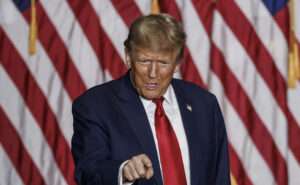The Volokh Conspiracy
Mostly law professors | Sometimes contrarian | Often libertarian | Always independent
Donald Trump's Demand for Absolute Immunity for Crimes Committed While President Goes Far Beyond the Qualified Immunity Police Officers Get
Qualified immunity is a badly flawed doctrine the Supreme Court should abolish. But Trump's demands are much more extreme.

Despite attempts to claim otherwise, Donald Trump's demand for absolute immunity for any criminal acts committed while president goes far beyond the qualified immunity currently extended to police officers and other government officials. A recent Politifact article (where I and other legal scholars were interviewed) explains why:
As former President Donald Trump petitions the courts to be held legally immune for his actions as president, he's begun comparing presidents and police officers.
In a Jan.19 Truth Social post, Trump argued that "a president of the United States must have full immunity, without which it would be impossible for him/her to properly function." He added that immunity is needed even for "events that 'cross the line,'" though he didn't specify what he meant.
"You can't stop police from doing the job of strong & effective crime prevention because you want to guard against the occasional 'rogue cop' or 'bad apple,'" he wrote in all caps….
Legal experts told PolitiFact that whatever the judicial ruling, Trump's suggestion that he's seeking what police officers already have is flawed.
"What Trump seeks goes far beyond" the protections police officers have, said Ilya Somin, a George Mason University law professor….
The legal protection that police officers and other government officials are afforded is known as "qualified immunity." It is intended to protect officers conducting official duties not only from being held financially liable for their actions but also from being forced to face trial over those actions.
But as the "qualified" denotes, this type of immunity is not all-encompassing for key reasons:
- It applies to civil cases, not criminal charges. "It has nothing to do with criminal liability," said Joanna C. Schwartz, a UCLA law professor. If officers are charged with a crime, as happened with the officers in the 2020 death of Minneapolis resident George Floyd, they can stand trial.
- In civil cases, accused officers have to invoke qualified immunity as a defense, and the judge may or may not grant them protection. The accused officer can still be pursued in a civil lawsuit if the judge decides that that officer acted incompetently or knowingly violated the law….
Schwartz said the qualified immunity defense "is very strong, but it is not insurmountable…."
Trump's lawyers have said in court that they are seeking much broader immunity than what police officers receive.
Trump "seeks full immunity, not just 'qualified' immunity," Somin said. "And he is seeking immunity for criminal conduct, not just civil violations."
During oral arguments Jan. 9 before the three-judge federal panel, one judge asked Trump's attorney, D. John Sauer, whether the president should, hypothetically, be immune from prosecution for ordering U.S. Navy commandos to assassinate a political rival.
Sauer said that unless the president had been impeached first, such a prosecution would be invalid.
If you don't want to take my word for the difference between the two, you should at least heed that of Joanna Schwartz, who is probably the nation's leading expert on qualified immunity.
As both she and I have argued in the past, qualified immunity is a badly flawed court-created doctrine that the Supreme Court would do well to reverse. But I must acknowledge QI is at least endorsed by current Supreme Court precedent. The absolute immunity Trump seeks has no such precedent behind it, and would be even more egregious than QI is. It goes much further, and would allow presidents to escape liability for even the most serious crimes. Moreover, unlike a cop on the beat, a president cannot readily argue that he has to make quick decisions on the fly with no opportunity to seek legal advice.
No government official deserves such sweeping immunity. And certainly not the one with the greatest potential to abuse it. Even if you trust presidents of your preferred party with that kind of power, ask yourself if you have similar faith in presidents of the opposing party.


Show Comments (250)